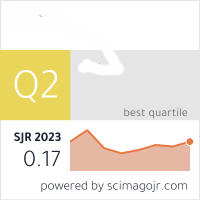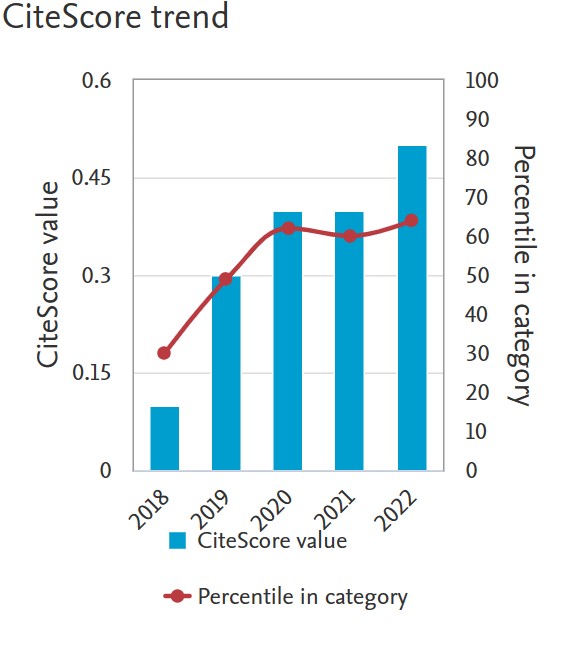The Role of Monogenic Factors in Recurrent Pregnancy Loss in Iraqi Consanguineous Family with Variant Identifications by Couple whole Exome Sequencing Test
Keywords:
RM: Recurrent Miscarriage, ACMG: American College of Medical Genetics, NGS: Next-Generation Sequencing, PKD: Polycystic kidney diseaseAbstract
Miscarriages occur in 15% of clinically identified pregnancies. At least two pregnancy losses constitute recurrent miscarriage (RM), which affects 1% to 5% of couples seeking to conceive. Both the genetic makeup and clinical presentation of RM are extremely varied. This research included 10 RM couples. Samples were taken from October 2021 to November 2022. Whole Exome Sequencing was used to identify the unknown genetic factors responsible for RM in tenth couples. The analysis of the carrier test determined a rare recurrent pregnancy loss associated with the autosomal recessive mutation. In addition, most of these cases were associated with close relative marriage. This type of pregnancy loss occurs in women, whose hormone level, ultrasound, and biochemical test reports were normal. Thisstudy identified thirteen pathogenic variants (PAH, ETHE1, BTD, GJB2, FOX3, HBA2, CYP21A2, NAGA, TBCE, PKHD1, FKBP10, ASPA, PLA2G6), seven likely pathogenic variants (FRAS1, NAGLU, PIEZO, DDHD2, TRIP4, CTU2, AGRN), and one VUS in FUT8 gene, in the autosomal recessive genes using WES. However, both patients and partners have altered variants in 20% ETHE1 genes; 15% FOX3; 10% of ASPA, DDHD2, PIEZO1, PKHD1, FUT8, and PAH. The detected mutations linked to multisystem abnormalities, neurodevelopmental disorders, cardiac malformations, skeletal dysplasia, metabolic disorders and renal diseases, fetal development during pregnancy, and recurrent miscarriage.
Downloads
References
Warburton, F.C. Fraser. Spontaneous abortion risk in man: data from
reproductive histories collected in a medical genetics unit,Am. J.
Hum. Genet., 16 (1964), pp. 1-5.
G.M. Stirrat, Recurrent miscarriage I: definition and epidemiology,The
Lancet,Volume 336, Issue 8716,1990,Pages 673-675,ISSN 0140-
Royal College of Obstetricians & Gynaecologists. The investigation and
treatment of couples with recurrent first trimester and secondtrimester miscarriage. Green-top Guideline No. 19. April 2011.
Raj R, Regan L. Recurrent miscarriage. Lancet 2006;
:60le11.Recurrent miscarriage suggests genetic linkage. Mol
HumReprod, 2011. 17(6).
Holly B Ford, Danny J Schust. Recurrent pregnancy loss: etiology,
diagnosis, and therapy. Rev Obstet Gynecol. 2009 Spring;2(2):76-
PMID: 19609401; PMCID: PMC2709325.
S. Daher, N. Shulzhenko, Andrey Morgun, Rosiane Mattar, Gisele F
Rampim, Luiz Camano, Maria Gerbase DeLima, Associations
between cytokine gene polymorphisms and recurrent pregnancy
lossjournal of Reproductive Immunology,Volume 58, Issue
,2003,Pages 69-77,ISSN 0165-0378.
Sui, Z., Moran, L., Cramp, C. et al. A decrease in diet quality occurs
during pregnancy in overweight and obese women which is
maintained post-partum. Int J Obes 37, 704-711 (2013).
Pereza N, Ostojic S, Kapovic M, et al. Systematic review and meta-analysis of
genetic association studies in idiopathic recurrent spontaneous abortion.
Fertil Steril 2016 Nov11. pii:SOO15-0282(16) 62924e2.
Najafi, K., Mehrjoo, Z., Ardalani, F. et al. Identifying the causes of
recurrent pregnancy loss in consanguineous couples using whole
exome sequencing on the products of miscarriage with no
chromosomal abnormalities. Sci Rep 11, 6952 (2021).
Drury S, Williams H, Trump N, Boustred C; GOSGene, Lench N, Scott RH,
Chitty LS. Exome sequencing for prenatal diagnosis of fetuses with
sonographic abnormalities. Prenat Diagn. 2015 Oct;35(10):1010-7. doi:
1002/pd.4675. Epub 2015Sep 11. PMID: 26275891.
Drousiotou, A., DiMeo, L, Mineri, R., Georgiou, T., Stylianidou, G., Tiranti,
V. Ethylmalonic encephalopathy: application of improved biochemical
and molecular diagnostic approaches.Clin. Genet.79: 385-390, 2011.
Zurfluh, M. R., Zschocke, J., Lindner, M., Feillet, F., Chery, C., Burlina,
A., Stevens, R. C., Thony, B., Blau, N. Molecular genetics of
tetrahydrobiopterin-responsive phenylalanine hydroxylase
deficiency. Hum. Mutat. 29: 167-175, 2008.
Kawashima, H., Kawano, M., Masaki, A., Sato, T.Three cases of untreated
classical PKU: a report on cataracts and brain calcification.Am. J. Med.
Genet. 29:89-93, 1988. [PubMed:3344778]
Zotkowska J, Hozyasz KK, Nowacka M. [Singleton and twin pregnancies
of PKU patients - individual variability of phenylalanine tolerance:
experience of a single treatment center (Preliminary report)].
Developmental Period Medicine. 2017;21(4):344-360. PMID:
; PMCID: PMC8522932
Yu M, Linn KA, Shinohara RT, Oathes DJ, Cook PA, Duprat R, Moore
TM, Oquendo MA, Phillips ML, McInnis M, Fava M, Trivedi MH,
McGrath P, Parsey R, Weissman MM, Sheline YI. Childhood
trauma history is linked to abnormal brain connectivity in major
depression. Proc Natl Acad Sci USA. 2019 Apr 23;116(17):8582-
doi: 10.1073/pnas.l900801116. Epub 2019 Apr 8. Erratum in:
Proc Natl Acad Sci USA. 2019 Jun 25;116(26):13146. PMID:
; PMCID: PMC6486762.
Ng BG, Xu G, Chandy N, Steyermark J, Shinde DN, Radtke K, Raymond K,
Lebrilla CB, AlAsmari A, SuchySF, Powis Z, Faqeih EA, Berry SA, Kronn
DF, Freeze HH. BiallelicMutationsin FUT8 Cause aCongenital Disorder
of Glycosylation with Defective Fucosylation. Am J Hum Genet. 2018 Jan
;102(l):188-195. doi: 10.1016/j.ajhg.2017.12.009. PMID: 29304374;
PMCID: PMC5777984.
Ward CJ, Hogan MC, Rossetti S, Walker D, Sneddon T, Wang X, Kubly
V, Cunningham JM, Bacallao R, Ishibashi M, Milliner DS, Torres
VE, Harris PC. The gene mutated in autosomal recessive polycystic
kidney disease encodes a large, receptor-like protein. Nat Genet.
Mar;30(3):259-69. doi: 10.1038/ng833. Epub 2002 Feb 4.
PMID: 11919560.
Shuster S, Keunen J, Shannon P, Watkins N, Chong K, Chitayat D.
Prenatal detection of isolated bilateral hyperechogenic kidneys:
Etiologies and outcomes. Prenat Diagn. 2019 Aug;39(9):693-700.
doi:10.1002/pd.5418. Epub 2019 Feb 20. PMID: 30650191.
Schueler M, Halbritter J, Phelps IG, Braun DA, Otto EA, Porath JD, Gee
HY, Shendure J, O'Roak BJ, Lawson JA, Nabhan MM, Soliman NA,
Doherty D, Hildebrandt F. Large-scale targeted sequencing
comparison highlights extreme genetic heterogeneity in
nephronophthisis-related ciliopathies. J Med Genet. 2016
Mar;53(3):208-14. doi: 10.1136/jmedgenet-2015-103304. Epub
Dec 16. PMID: 26673778; PMCID: PMC5057575.
Wang J, Qi D, Yang J, Zhang D, Wang Q, Ju X, Zhong X. Novel
compound heterozygous PKHD1 mutations cause autosomal
recessive polycystic kidney disease in a Han Chinese family. Mol
Med Rep. 2019 Dec;20(6):5059-5063. doi:
3892/mmr.2019.10738. Epub 2019 Oct 11. PMID: 31638247;
PMCID: PMC6854546.
Andolfo I, De Rosa G, Errichiello E, Manna F, Rosato BE, Gambale A, Vetro A,
Calcaterra V, Pelizzo G, De Franceschi L, Zuffardi O, Russo R, lolascon
A.PIEZOlHypomorphic Variants in Congenital Lymphatic Dysplasia
Cause Shape and Hydration Alterations of Red Blood Cells. Front Physiol.
Mar 15; 10:258. doi: 10.3389/fphys.2019.00258. PMID: 30930797;
PMCID: PMC6428731.
Sreevishnupriya K, Chandrasekaran P, Senthilkumar A, Sethumadhavan R, Shanthi V, Daisy P, Nisha J, Ramanathan K, Rajasekaran R.
Computational analysis of deleterious missense mutations in
aspartoacylase that cause Canavan's disease.Sci China Life Sci. 2012
Dec;55(12):l109-19. doi: 10.1007/sl1427-012-4406-8. Epub 2012
Dec 12. PMID: 23233226.
Reis LM, Tyler RC, Schneider A, Bardakjian T, Stoler JM, Melancon SB,
Semina EV. FOXE3 plays a significant role in autosomal recessive
microphthalmia. Am J Med Genet A. 2010 Mar;152A (3):582-90.
doi: 10.1002/ajmg.a.33257. PMID: 20140963; PMCID:
PMC2998041.
Chassaing N, Causse A, Vigouroux A, Delahaye A, Alessandri JL,
Boespflug-Tanguy O, Boute-Benejean O, Dollfus H, Duban-Bedu
B, Gilbert-Dussardier B, Giuliano F, Gonzales M, Holder-Espinasse
M, Isidor B, Jacquemont ML, Lacombe D, Martin-Coignard D,
Mathieu-Dramard M, Odent S, Picone O, Pinson L, Quelin C,
Sigaudy S, Toutain A, Thauvin-Robinet C, Kaplan J, Calvas P.
Molecular findings and clinical data in a cohort of 150 patients with
anophthalmia/microphthalmia. Clin Genet. 2014 Oct;86(4):326-34.
doi: 10.1111/cge.12275. Epub 2013 Oct 7. PMID: 24033328.
Cheong SS, Hentschel L, Davidson AE, Gerrelli D, Davie R, Rizzo R,
Pontikos N, Plagnol V, Moore AT, Sowden JC, Michaelides M,
Snead M, Tuft SJ, Hardcastle AJ. Mutations in CPAMD8 Cause a
Unique Form of Autosomal-Recessive Anterior Segment
Dysgenesis. Am J Hum Genet. 2016 Dec 1;99(6):1338-1352. doi:
1016/j.ajhg.2016.09.022. Epub 2016 Nov 10. PMID: 27839872;
PMCID: PMC5142107.
Gould DB, John SW. Anterior segment dysgenesis and the developmental
glaucomas are complex traits. Hum Mol Genet. 2002 May
;ll(10):l185-93. doi: 10.1093/hmg/l1.10.1185. PMID: 12015278.
Maruyama T, Baba T, Maemoto Y, Hara-Miyauchi C, Hasegawa-Ogawa
M, Okano HJ, Enda Y, Matsumoto K, Arimitsu N, Nakao K,
Hamamoto H, Sekimizu K, Ohto-Nakanishi T, Nakanishi H,
Tokuyama T, Yanagi S, Tagaya M, Tani K. Loss of DDHD2, whose
mutation causes spastic paraplegia, promotes reactive oxygen
species generation and apoptosis. Cell Death Dis. 2018 Jul
;9(8):797. doi: 10.1038/s41419-018-0815-3. PMID: 30038238;
PMCID: PMC6056544.
Alrayes N, Mohamoud HS, Jelani M, Ahmad S, Vadgama N, Bakur K,
Simpson M, Al-Aama JY, Nasir J. Truncating mutation in
intracellular phospholipase Ai gene (DDHD2) in hereditary spastic
paraplegia with intellectual disability (SPG54). BMC Res Notes.
Jun 27; 8:271. doi: 10.1186/sl3104-015-1227-4. PMID:
; PMCID: PMC4482296.
Kaul R, Gao GP, Matalon R, Aloya M, Su Q, Jin M, Johnson AB,
Schutgens RB, Clarke JT. Identification and expression of eight
novel mutations among non-Jewish patients with Canavan disease.
Am J Hum Genet. 1996 Jul;59(1):95-102. PMID: 8659549; PMCID: PMC1915091.
Sreevishnupriya K, Chandrasekaran P, Senthilkumar A, Sethumadhavan R, Shanthi V, Daisy P, Nisha J, Ramanathan K, Rajasekaran R. Computational analysis of deleterious missense mutations in aspartoacylase that cause Canavan's disease.Sci China Life Sci. 2012 Dec;55(12):l109-19. doi: 10.1007/sl1427-012-4406-8. Epub 2012 Dec 12. PMID: 23233226.
Bley A, Denecke J, Kohlschutter A, Schon G, Hischke S, Guder P, Bierhals T, Lau H, Hempel M, Eichler FS. The natural history of Canavan disease: 23 new cases and comparison with patients from literature. Orphanet J Rare Dis. 2021 May 19;16(1):227. doi: 10.1186/sl3023- 020-01659-3. PMID: 34011350; PMCID: PMC8132415.
Downloads
Published
Issue
Section
License
You are free to:
- Share — copy and redistribute the material in any medium or format for any purpose, even commercially.
- Adapt — remix, transform, and build upon the material for any purpose, even commercially.
- The licensor cannot revoke these freedoms as long as you follow the license terms.
Under the following terms:
- Attribution — You must give appropriate credit , provide a link to the license, and indicate if changes were made . You may do so in any reasonable manner, but not in any way that suggests the licensor endorses you or your use.
- No additional restrictions — You may not apply legal terms or technological measures that legally restrict others from doing anything the license permits.
Notices:
You do not have to comply with the license for elements of the material in the public domain or where your use is permitted by an applicable exception or limitation .
No warranties are given. The license may not give you all of the permissions necessary for your intended use. For example, other rights such as publicity, privacy, or moral rights may limit how you use the material.











